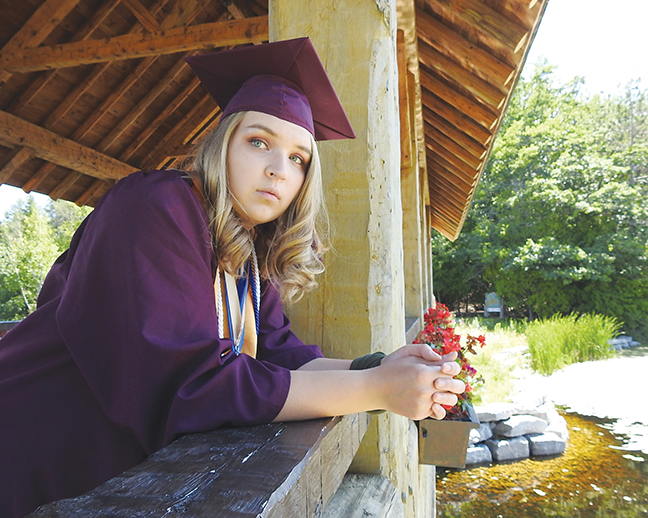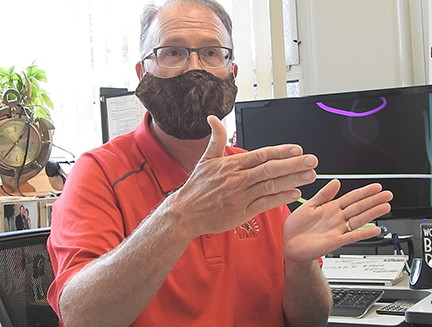COVID Kids: Grads forced to change track after pandemic upends everything

News Photo by Julie Riddle Recent Alpena Community College graduate Justice Tolen looks toward the future as one of the survivors of the Class of 2020.
ALPENA — “The biggest thing I’ll remember is not having memories,” said George Pilarski, an Alpena High School graduate and member of the Class of 2020, a group of high schoolers that may go down in the record books as having the strangest end-of-school experiences in modern American history.
Like graduates all over the country, Pilarski ended 12th grade without the buzz and bustle of graduation parties, dances, and college preparations that often mark a launch into adulthood.
When the COVID-19 pandemic upended classrooms, most students left school for spring break and never went back as Gov. Gretchen Whitmer closed school buildings to prevent the spread of the virus.
Now, as they attend virtual college freshman orientations and wonder if they’ll have enough money to get to the future they had planned, members of the Class of 2020 face tough decisions about whether to attend universities or community college, whether to enter the workforce when jobs are scarce or hope they can afford tuition.
“It’s kind of shaky,” Pilarski said. “To say the least.”

News Photo by Julie Riddle Alpena High School Assistant Principal Romeo Bourdage talks about the struggles facing this year’s graduating class as they move into adulthood.
In Northeast Michigan, 490 seniors — including 277 from Alpena High School — were ready for gowns and tassels before schools across the state and nation closed to prevent the spread of the coronavirus.
Not only did this year’s seniors miss the senior lock-in, prom, and senior skip day, they also missed opportunities that could have made all the difference in their futures, said Romeo Bourdage, assistant principal at Alpena High School.
Spring-sport athletes didn’t get to display their prowess, possibly earning a full-ride athletic scholarship to the school of their dreams.
Seniors didn’t have the last three months of school to get engrossed in the what-ifs and receive tidbits of advice from teachers who knew their strengths.
The son of a Pearl Harbor survivor, Bourdage pointed to other generations of Americans defined by wars, assassinations, and economic struggle.

Courtesy Photo George Pilarski wears the colors of the Alpena High School Class of 2020, a class facing challenges in a year of change.
“Thirty years from now, it’s going to be 2020 COVID,” he predicted. “They’re going to come back and say, ‘What happened to kids? What did they miss?'”
‘THE WHOLE WORLD IS A QUESTION MARK’
For many high school grads — including 70% of Alpena County high schoolers in 2017, according to the Michigan College Access Network — the immediate future typically involves higher education.
Across the state, colleges and universities are creating reopening plans that call for in-person classes, virtual lectures, or a combination thereof.
Some schools have revised their start dates, will restrict movement on and off campus for the first semester, or will move to all-online classes beginning in November. Study-abroad programs are canceled.

News Photo by Julie Riddle A Rogers City High School graduate celebrates the end of an unusual senior year at a parade past cheering supporters of the Class of 2020 in June.
Students already nervous about starting a new life surrounded by strangers now have to meet those strangers without get-to-know-you social activities often planned for incoming freshmen, without the relative comfort of the known environment of a classroom.
The ACT and SAT, standardized tests traditionally used by colleges to determine whether a student will be accepted and the amount of financial aid offered, weren’t an option for many students planning to take the tests during this year’s spring semester.
Students who built their whole school careers toward the tests are confused by suddenly not having to take them, according to Josh Smith, a member of the Michigan School Counselor Association executive board.
While the creators of the ACT and SAT are preparing to make the tests available to students in their homes this fall, about 90% of colleges and universities have dropped or adjusted their standardized test requirements, weighing admissions decisions based more on essays and other aspects of a student’s application, Smith said.
In a way, a lesser emphasis on standardized tests will be an equalizer, Smith said, leveling the playing field for students who have academic strengths but don’t test well.

News Photo by Julie Riddle A Rogers City High School graduate celebrates the end of an unusual senior year at an outdoor graduation ceremony in July for the Class of 2020.
Most of the Rogers City High School Class of 2020 took standardized tests, began college applications, and completed required paperwork to receive federal student aid before schools were shut down in March, according to Marilyn Dimick, the school’s guidance counselor.
Her 2020 seniors and the schools they will attend have been doing well, she thinks.
It’s hard to say for sure, though.
With students exiled from the school, a counselor’s usual busy spring of keeping seniors on a college track became a season of missing the kids and hoping they were taking necessary pre-college steps on their own.
“The whole world is a question mark,” said Mary Daoust, one of several counselors at Alpena High School.

Courtesy Photo Ryan Fewins-Bliss, executive director of the Michigan College Access Network, is seen in this provided photo.
She hasn’t heard from many members of the Class of 2020. They don’t know what to ask, she thinks.
The Class of 2020 are survivors, Daoust said. Most were born in the year of the 9/11 attacks. Their entire life has been an assortment of upheavals. They’ve done chaos.
That’s the only world they know, she said.
Wearing the burgundy and white of ACC, 2020 graduate Justice Tolen — enrolled since her sophomore year in high school in ACC’s early college program — said the coronavirus has “definitely thrown us a curveball.”
Tolen battled through 22 credits of spring-semester virtual classes to an associate’s degree at ACC a year after walking through a graduation ceremony in the green and white of Alpena High School.
Heading to Northern Michigan University this fall, she was relieved when her school said they’d allow some classes to meet in classrooms instead of online. Though they grew up in a digital world, many students were shaken by the transition to virtual classes.
Students at Northern will have to wear masks except in their dorm rooms, and she’s been told to pack a quarantine bag, in case she has to be sent to the school’s special quarantine area for two weeks after she’s tested upon arrival at the school.
“It’s definitely not what we planned,” Tolen said. “But, life never is.”
Check out this video of interviews with some of the subjects of this story. Viewing on mobile? Turn your device horizontally for the best viewing experience. Story continues below video.
‘DOUBLE WHAMMY’
One in six college-bound high school seniors nationwide don’t think they will pursue their plans to attend a four-year college this fall, according to a survey by the education research company Art and Science Group.
About 35% of those plan to take a gap year instead — entering the workforce, intending to return to full-time education in fall 2021.
While many jobs exist for people without college degrees, students who never earn one will be financially worse off than those who do, according to Ryan Fewins-Bliss, executive director of the Michigan College Access Network.
In the years following America’s last recession, 99% of the 11 million new jobs created went to people with postsecondary degrees.
But a four-year college can be dauntingly expensive.
An average low-income Michigan student living on campus at a four-year public college who works a summer job falls over $1,500 short of being able to pay annual tuition, even after financial aid, a study by the National College Access Network showed.
This year, not all students could get or keep that summer job to help cover that cost.
Before the pandemic, almost a quarter of students in Michigan required remedial courses, which adds to the cost of a degree. More students could need those catch-up courses after being forced away from classrooms for the past six months.
Add to that an unstable economy — which, for some students, means parents who have lost their jobs and are no longer able to help pay tuition — and the financial burden can become “a double whammy” that makes graduating seniors feel they have to walk away from higher education, Fewins-Bliss said.
Michigan’s unemployment rate in June was about 15%. About 11% of Alpena County workers were out of a job, according to the most recent state data.
There’s hope, Fewins-Bliss said: a job loss or other unexpected financial hit — if reported to a university’s financial aid office — can lead to more federal, state, and other aid.
Another option experts think many members of the Class of 2020 will explore is staying local and attending a community college, vastly more affordable than starting out at a four-year university.
Alpena Community College will have in-person classes this fall, according to Don MacMaster, ACC president. The school’s videoconference-equipped classrooms allow one class to be spread over two classrooms at once, with students in each room able to attend lectures simultaneously.
Graduates of ACC’s occupational programs, such as concrete, welding, utility tech, and health care, are still being eagerly sought by local employers, MacMaster reported, and many students are able to work while they attend classes.
‘WE’LL FIGURE IT OUT’
The coronavirus changed everything, Pilarski, the Alpena High graduate, said.
On-track to complete an associate’s degree in small business management from ACC as part of an early college program, he had to give up his spring semester as a loss after the unexpected and disjointing move to remote learning.
One of his friends, who was planning to go away to college on a full-ride scholarship, decided to stay at home this year, afraid of getting sick.
The end of the 2020 school year felt like a fog, and the future isn’t much clearer for students leaving high school behind and stepping onto shaky ground, Pilarski said.
Still, “we’re a lot of strong, independent people,” he said, “and there’s not a single one of us that can’t overcome anything that happens, whether it be a pandemic or just an awful time. We’ll figure it out.”
- News Photo by Julie Riddle Recent Alpena Community College graduate Justice Tolen looks toward the future as one of the survivors of the Class of 2020.
- News Photo by Julie Riddle Alpena High School Assistant Principal Romeo Bourdage talks about the struggles facing this year’s graduating class as they move into adulthood.
- Courtesy Photo George Pilarski wears the colors of the Alpena High School Class of 2020, a class facing challenges in a year of change.
- News Photo by Julie Riddle A Rogers City High School graduate celebrates the end of an unusual senior year at a parade past cheering supporters of the Class of 2020 in June.
- News Photo by Julie Riddle A Rogers City High School graduate celebrates the end of an unusual senior year at an outdoor graduation ceremony in July for the Class of 2020.
- Courtesy Photo Ryan Fewins-Bliss, executive director of the Michigan College Access Network, is seen in this provided photo.
- Courtesy Photo Josh Smith, Michigan School Counselor Association executive board member, is seen in this provided photo.
- Courtesy Photo Don MacMaster, president of Alpena Community College, is seen in this provided photo.

Courtesy Photo Josh Smith, Michigan School Counselor Association executive board member, is seen in this provided photo.

Courtesy Photo Don MacMaster, president of Alpena Community College, is seen in this provided photo.












